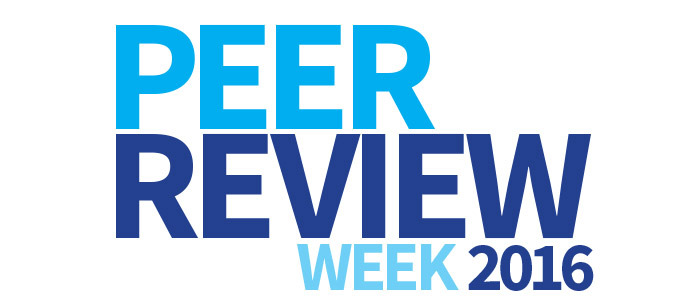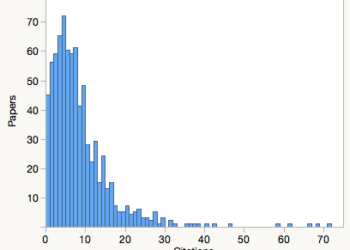Editor’s Note: The post was primarily drafted by Alice Meadows, chair of the Peer Review Week planning committee, with help from fellow committee member, Angela Cochran.

Peer Review Week 2015 was a small, experimental, toe-in-the-water kind of event. But it struck a chord with many individuals and organizations. As a result, we are delighted to announce that the second Peer Review Week will take place this year from September 19-26.
This global event celebrates the essential role that peer review plays in maintaining scientific quality, bringing together individuals, institutions, and organizations committed to sharing the central message that good peer review — whatever shape or form it might take — is critical to scholarly communications.
The theme of this year’s Peer Review Week is “Recognition for Review”. We want to explore all aspects of how those participating in review activity — publishing, grant review, conference submissions, promotion and tenure, and more — should be recognized for their contribution.
There’s an increasing body of evidence that, while researchers don’t want or expect to be paid for peer review, they do want recognition for it — not least because of the amount of time they spend on it!
Taylor & Francis’ recent survey found that “playing their part as a member of the academic community, reciprocating the benefit, and improving papers were the most important motivations for carrying out reviews.” Additionally, in a 2014 open letter to universities, funders, and other research institutions in Australia, a group of journal editors identified the need for “more direct recognition of reviewing and editing services as a part of academic roles.”
Of course, services such as Publons and PRE already provide a way for publishers to recognize reviewers while still maintaining control over what information about the review process is shared. Publisher initiatives include published reviewer lists, reward programs for reviewers, and reviewer profiles. There are very important discussions happening between journal publishers and the communities they serve around the levels of openness and in many cases recognition.
And, with my ORCID hat on*, another potential opportunity for this kind of recognition is ORCID’s peer review functionality, which enables any organization that uses peer reviewers to recognize their contributions by adding information about review activities to an individual’s ORCID record. This information can be very sparse (for double blind peer review) or comprehensive (for open peer review), or anything in between.
One big change for Peer Review Week this year is that over 20 organizations are represented on the planning committee. This has given us much broader representation, although in fairness, we are still mostly limited to journals publishers from North America and the UK. We would love to see more participation from other regions, books publishers, and non-publishing organizations that undertake peer review, such as funders, universities and research institutions, associations, and more.
It’s not too late to volunteer to join the planning committee and, of course, everyone is invited to help support Peer Review Week by engaging with our social campaign #PeerRevWk16 and #RecognizeReview. We encourage you to share our content and create your own (e.g., blog posts, editorials, social media shout outs to your reviewers). Feel free to use the Peer Review Week logo available here in promoting your activities.
Most importantly, tell us what you are planning to do for the celebration. Email us with the subject line “Peer Review Week” and include a brief description of the event or resource and we will try to feature it on the Peer Review Week website.
Planned activities so far include virtual and in-person events such as webinars, videos, interviews, and social media activities designed to improve understanding of the principle of peer review and how it is practiced within the scholarly community. We are also pulling together a comprehensive list of online resources to advance our understanding of peer review and its role in 21st century scholarship.
If you care about peer review and the important role it plays in scholarly communication, come help us celebrate!
*Full disclosure: the author of this post, Alice Meadows, is the Director of Community Engagement & Support for ORCID.
Discussion
14 Thoughts on "Peer Review Week 2016 #RecognizeReview"
Great article, Alice (and Angela), I do hope it has the desired effect to make many more aware of the unsung heroes who contribute hours to ensure accuracy, originality, and appropiate content in literature worldwide. One observation: In the second paragraph, first sentence, you cite “scientific quality.” I think it’s important to recognize the contribution peer review makes to the inherent quality of every discipline’s literature. Perhaps using the acronym STEAM – science, technology, engineering, arts, and mathematics – plus professional and medical will give the reader an understanding of the full scope of peer review, its importance and influence.
Thanks Barbara, you are quite right to point this out – we will make sure this is clear in our promotion for Peer Review Week.
Dear Alice
Many thanks for that clarification. At the same time, the project does seem geared very much to peer review of articles, whereas many of the most sustained and committed examples of peer review (not least in the generation of extended multi-page reports) come from the domain of scholarly books. Is that a fair criticism, and is that the intended emphasis? The authors of reports on books are of course in general paid a modest something (whether in cash or books in lieu) for their services, so maybe the perceptions around ‘reward’ are different? Many thanks Richard
Hi Richard, that is a fair comment, and reflects the fact that – despite our call for participation from the wider community – our planning committee is primarily made up of people working in journal publishing. We hope to address this during Peer Review Week itself by covering book reviews along with peer review activities for, e.g., promotion and tenure committees, conference abstracts, funding applications, and more. And, of course, it’s not too late for people working in those areas to get involved in the planning committee and/or send us your suggestions for PRW activities!
Many happy returns.
I wonder though, but have been afraid to ask. When they ask me to review a paper, could I ask them back to send me at least the articles this paper refers to. Or do they assume I know where sci-hub is?
Good morning Igor. If you read every paper cited in papers you are reviewing than you are a super reviewer! We know that reviewers don’t read the papers cited for a number of reasons. One is the amount of time reviewers report on surveys that they spend reviewing a paper. But either way, you ask an interesting question about the review process. I have been in editorial board meetings where the topic of non-English references were raised. Someone on the board questions how a reviewer can review a paper if papers cited are in Chinese, Farsi, Persian, German, etc. The answer is that they can’t. Even if they can access the papers, unless they are fluent in the language, the paper can’t be read. That said, you would not want to tell an author that they can’t cite work done and published in other languages, particularly if they are citing their own work done in regional journals or their thesis.
If a reviewer contacted me and said, here is a paper that is referenced a lot and it was published in one of our journals and the reviewer did not have access and needed to read the paper in order to complete the review, I would provide the paper. I can also say that in the 11 years I have worked on the peer review side of things, this has never been requested of me.
On the other hand, I worked as an EA for a small society journal and got requests like this maybe a handful of times in my almost-three years there. As long as the Reviewer requested it to complete the review, and the ED approved sending the paper, I gladly did so. It does make me curious to know whether the reason this doesn’t happen more frequently is because either (1) the reviewers can access the cited papers through other means, or (2) they didn’t consider that they could ask for and receive the paper in question.
Nobody taught me to do reviews. I am a shy auto deduct too afraid to ask questions.
I don’t need all of those citations. I’ve read some, I know that refs. [1-8] do not mean anything and are probably copied (they have huge citation index), I know that some quotes are just technical (for a parameter) etc. But I have to put the the paper in the scope, to compared it with the previous work of the authors and others in the field. So, in fact I need only a few.
Some authors write that the procedure was described in their previous paper and then I see red (if it matters for understanding).
I guessed that most people would rather procure necessary material illegally than ask the editor.
I am rather curious as to just whom in academia does not know what reviewers do and just who do not appreciate their efforts. Do we need a reviewer academy awards ceremony ever year to praise their efforts? Would such an event mollify those who feel slighted. In graduate school I took readings courses and had to write a review of what I read. My reviews were critiqued and I learned how to review in the process.
I would like to think that if one is accepted into a graduate program that one is smart enough or astute enough to learn the process. As a book editor, I would read reviews and if I received an unenlightened review or one that said nothing I simply did not use that reviewer again. My journal editors did the same.
Lastly, just who is the audience for review week. Is it newly accepted graduate students, or assistant professors? It seems to me that other than those mentioned they have run the gauntlet and know the procedure. In short, review is not their first rodeo!
We recently started sending a thank-you email and a certificate to our peer reviewers based on a presentation at the most recent Council of Science Editors Meeting. I’m sorry I don’t have the name of the person who made the presentation. The response was very positive from the editors of our journals, our publications committee, and especially the reviewers. We received responses along the lines of “No one ever thanked me for doing this before.” “I’m thinking of framing the certificate to hang in my office.” “Thanks for appreciating my time and effort on behalf of the journal.” Getting recognition for this work seems to be very important to many people. No one likes to be taken for granted.
Congratulations on this initiative! Any effort that helps to recognise the valuable contributions of this underappreciated community of experts is welcome.
This article highlights the need of recognizing and rewarding reviewers and describes how online platforms can ease achieving this objective at the time of being a source for recruiting reviewers and recording review activity.
A description and a comparison of the main online platforms available today is available at http://publishopenaccess.blogspot.com.es/2016/01/online-platforms-for-recruiting-and.html



